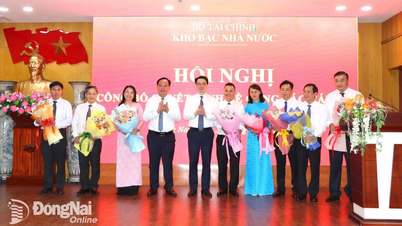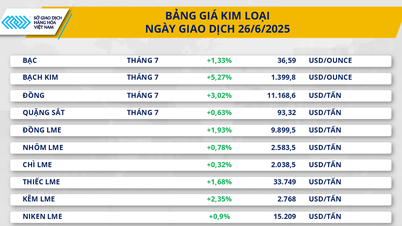Proposal to remove barriers to gold trading
The Vietnam Federation of Commerce and Industry (VCCI) recently sent a document to the State Bank of Vietnam (SBV), providing comments on the Draft Decree amending and supplementing Decree 24/2012/ND-CP on the management of gold trading activities.
In particular, VCCI proposed to boldly remove some unnecessary conditions that are creating barriers for businesses, especially in the fields of gold bar production and gold jewelry and fine art trading.
Specifically, according to the draft, the condition for being licensed to produce gold bars is that the enterprise must have a minimum charter capital of VND1,000 billion. VCCI believes that this is too high a threshold, causing obstacles for most enterprises, especially domestic private enterprises.
Setting such a large capital requirement would narrow the playing field, leading to a market dominated by a few “big guys”, limiting competition, reducing supply diversity and negatively affecting consumer choice.
Regarding the gold jewelry and handicraft business, VCCI believes that continuing to maintain business conditions is no longer appropriate. According to the analysis, this type of business is not in the group of special industries related to national defense, security, social ethics or public health, the fields that the Investment Law allows to apply business conditions.
Furthermore, the current requirements for gold jewelry businesses are mainly related to facilities and equipment similar to any normal commodity business. Therefore, classifying this sector as a conditional business lacks practical and legal basis.
VCCI also emphasized that maintaining business conditions for gold jewelry goes against the policy of administrative reform, cutting down on "sub-licenses", especially the spirit of Resolution 68/NQ-TW on innovation of the investment and business environment.
More importantly, this regulation is not compatible with the strategic orientation for developing the domestic gold jewelry industry, gradually turning Vietnam into a center for processing and exporting high-quality gold as directed by the General Secretary at the meeting with the Central Policy and Strategy Committee on May 28, 2025.
From the above analysis, VCCI proposed that the State Bank consider abolishing regulations on business conditions for gold jewelry, in order to create a healthy competitive environment, reduce compliance costs for businesses, and at the same time create room for the Vietnamese gold industry to develop to its full potential.
Proposal to remove "sub-license" for gold import
The Vietnam Federation of Commerce and Industry (VCCI) has just sent a document to the State Bank of Vietnam (SBV) proposing the removal of some unnecessary administrative procedures in the field of gold bar import, in order to simplify the process, reduce costs and create favorable conditions for businesses.
According to VCCI's comments on the Draft Amendment to Decree 24/2012/ND-CP, current regulations on gold bar import are considered "overly layered and confusing" due to the simultaneous requirement of many types of licenses, including: general gold import and export licenses; licenses for each specific shipment; and annual import and export limits. The overlapping of these procedures creates a system of "sub-licenses" that is time-consuming, costly to comply with, and significantly reduces business flexibility.
VCCI believes that while gold bar manufacturing enterprises have been licensed by the State Bank of Vietnam and are subject to strict supervision, continuing to require separate gold import and export licenses is unnecessary. This is a manifestation of the “license within a license” mechanism, which is both duplicative and wasteful of resources for both enterprises and management agencies.

Notably, VCCI also proposed to abolish the single import-export license. The reason is that the State Bank has set an annual import-export limit for each enterprise, a control tool that is effective enough.
Requiring businesses to “apply for permission one at a time” not only creates a procedural burden but can also cause them to lose business opportunities, especially in the context of the gold market fluctuating rapidly according to international developments. Delays in approval can cause businesses to miss out on profit or face price risks.
In terms of state management, VCCI proposed that the State Bank of Vietnam could still maintain control through more modern technical measures, such as connecting data with customs agencies, or requiring businesses to periodically report on the use of import-export quotas. These methods both ensure management objectives and avoid interfering too deeply in business activities.
In addition, VCCI also requested the SBV to clarify the legal basis and specific reasons for requiring businesses to only import gold bars or raw gold from manufacturers certified by the London Bullion Market Association (LBMA). According to VCCI, if there is no valid reason in terms of quality, international standards or anti-money laundering, this regulation could limit supply, affect production costs and indirectly affect domestic prices.
Overall, VCCI recommends that the drafting agency should prioritize modern management solutions, instead of continuing to apply pre-control thinking and administrativeizing the market. Creating conditions for businesses to be proactive, flexible and transparent will be the premise for the gold market to develop more stably and healthily in the future.
Clarifying regulations on gold derivatives and gold accounts
In its comments sent to the State Bank of Vietnam (SBV) on the Draft Decree amending and supplementing Decree 24/2012/ND-CP related to the management of gold trading activities, the Vietnam Federation of Commerce and Industry (VCCI) emphasized the lack of clarity in some regulations related to other gold trading activities, especially gold derivatives and gold trading on accounts.
According to VCCI, the Draft currently mentions other gold trading activities as restricted business sectors, but this basis is no longer suitable in the current legal system.
Specifically, the list of “restricted business goods and services” was once stipulated in the Commercial Law and sub-law documents, but was officially abolished under Decree 173/2024/ND-CP. Meanwhile, the 2020 Investment Law currently has only three groups of industries: prohibited business investment, conditional business investment, and free business investment. Therefore, the inclusion of “other gold business” in the restricted list has no clear legal basis.
In addition, the Draft stipulates that these activities can only be carried out when two conditions are met: (i) a permit decision from the Prime Minister and (ii) a license from the State Bank.
However, neither the Draft nor the original Decree provides any specific guidance on licensing conditions, nor related processes and procedures. This is inconsistent with Article 7, Clause 5 of the Investment Law 2020, which stipulates that all conditional business investment sectors must have their conditions, records, processes, licensing authorities and reasons for application clearly described.
Therefore, VCCI recommends that the State Bank should supplement details on conditions, processes and licensing procedures for other gold trading activities to ensure transparency, consistency and compliance with current investment laws.
Regarding gold derivatives activities, although the Draft lists this as a form of gold trading within the scope of the Decree, the specific content of the operating mechanism, conditions for participation and subjects allowed to implement it has not been clarified.
Currently, only credit institutions are allowed to conduct gold derivative transactions under the Law on Credit Institutions, while non-banking enterprises, financial institutions or gold trading units are not mentioned. This creates a significant legal gap, causing difficulties in both management and practical implementation.
Similarly, with gold trading on accounts, a popular form of transaction in the world, the Draft has not yet specified important factors such as: which organizations are allowed to provide services, which investors are allowed to participate, technical conditions, licensing process, transaction mechanism - order matching - payment...
VCCI believes that the lack of clear regulations on the two above-mentioned business forms will lead to legal risks, reduce transparency and cause difficulties for businesses when participating in the market.
Therefore, it is necessary to have detailed and complete instructions to ensure both strict management and encourage the development of modern gold business models in line with international trends.
Source: https://baodaknong.vn/vcci-de-nghi-xoa-bo-rao-can-hanh-chinh-voi-hoat-dong-xuat-nhap-khau-vang-256735.html






































































































Comment (0)